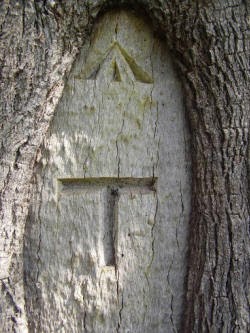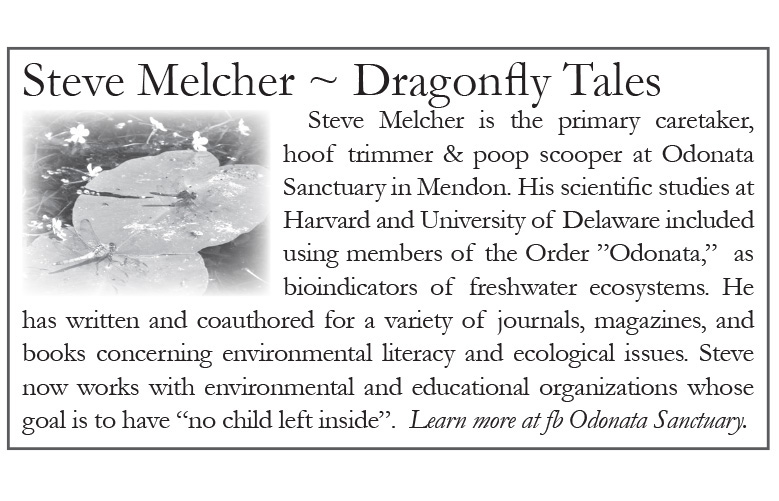Dragonfly Tales
A Lesson in repurposing, recycling, and windfalls
- By Steve Melcher
I want to thank our local Scout Troop 10/410 for not only providing a treat for the critters here at Odonata Sanctuary, but a lesson in sustainability and stewardship. We’ve all heard the saying, ‘When life gives you lemons, make lemonade’. That’s just what the scouts did with the ‘leftover’ lemon trees they were selling for the holidays. The ex-Xmas trees were heading for the landfill or the chipper, which would have used town labor and expensive fuel. Unfortunately, there were quite a few smaller spruce and pine trees, perfect for a 600-square-foot apartment in the Big Apple, but not suitable for most folks in upstate NY, who want to fill the family room with as big a tree as possible. After the holidays, there was a surplus of spruces. A call was out by phone and social media to ‘come and get em’. Folks showed up with pickup trucks and trailers, some even dragging them down the street tied to the backs of their Priuses, doing a great job of keeping the streets clean in the area. Odonata Sanctuary was contacted about the *windfall of ‘free if you can haul them’ trees. We told them that we would take any of the giveaway gymnosperms that were abandoned at the park. After all, Odonata Sanctuary is a hospice for farm animals, why not expand that to the plant kingdom? Before they were to be hauled away and chipped at taxpayer’s expense, the scouts loaded the balsam, larch and Fraser Firs onto a dump trailer and delivered them to the Sanctuary.
The scouts turned what was possibly a financial loss into a lesson of social responsibility and a lesson in ecology straight out of Barry Commoner’s Four Laws of Ecology. The abandoned trees could have have taken up space in a landfill, after all ‘Everything must go somewhere’. Or the trees could have been run through a chipper which uses fuel and labor and is designed to reduce the volume where, in most towns, ends in a landfill anyway. Or they could’ve become part of the ‘Great Christmas Tree Race’ where Concolor Christmas trees are tattooed and then dropped upstream into Honeoye Creek and tracked to see which one travels the farthest in three days. But, because ‘Everything is Connected to Everything Else’, they chose to put the word out to local goatherds, Solstice and Saturnalia celebrators and Christmas Tree collectors, but, most importantly, a local animal shelter, to provide food and shelter. This is a lesson in resource management as well. What happens to trees in a natural setting? Because Nature Knows Best, trees in the beautiful woods of the Finger Lakes, provide food and shelter when they are alive and when they are dead, decayed and decomposed, they provide nutrients for the firs of the future. The scouts learned that ‘There is no such thing as a free lunch’ by doing the best with a business deal that lost its bark.
Odonata Sanctuary received a small local grant specifically for trail maintenance that will require mulch on some of the footpaths. Where will we get the mulch? The Scouts! The Sanctuary has given half the funds to the scouts for the trees and is planning on providing an Eagle Scout Project for this summer. This will hopefully defray some of the losses from the annual tree sale.

The trees that the scouts provided will:
1. provide food for the goats** and donkeys here at the sanctuary; 2. Provide shelter for the geese and peafowl; 3. Provide a windbreak for the pot bellied pig shelter; 4. Dry needles, fallen from the trees, provide bedding for the warm blooded critters during the blustery upstate winters; and, 5. The skeletal remains of the spruce and pine will be mulched and spread across the 5 kilometers of trails where generations of nature lovers, including future and present scouts, will tread softly through the woods and fields of Odonata Sanctuary.
I’m looking out towards the barn where piles of pines are stacked against the windward side of the barn where two goats, Van Der and Stilton, are munching away in the manger on the eve of 12th Night. Thank you again, scouts.
Barry Commoner’s Four Laws of Ecology
1) Everything is connected to everything else
2) Everything must go somewhere
3) Nature knows best
4) There is no such thing as a free lunch
The scouts learned valuable lessons in the fields of economics and it’s cousin ecology; both using the suffix ‘eco’, meaning house. This generation has stepped up and is taking care of their house in the Anthropocene epoch.
*Windfall: The trees on a British nobleman’s estate, here in the colonies as well as back home in Great Britain, belonged to the king and were marked with the ‘King’s Mark’ . However, trees that had fallen in a storm were free to those who lived on the estate. Such a piece of luck was called a windfall. A tree commonly used today as a Christmas tree, the majestic White Pine, (Pinus strobus), played a crucial role in early American sailing history providing masts for the tall ships that brought prosperity to what became the USA.
**Goats, like deer are browsers and not grazers like cows and sheep.
